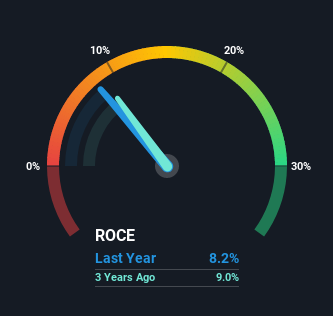- Netherlands
- /
- Professional Services
- /
- ENXTAM:INTER
Intertrust (AMS:INTER) Has More To Do To Multiply In Value Going Forward

What trends should we look for it we want to identify stocks that can multiply in value over the long term? Firstly, we'll want to see a proven return on capital employed (ROCE) that is increasing, and secondly, an expanding base of capital employed. Put simply, these types of businesses are compounding machines, meaning they are continually reinvesting their earnings at ever-higher rates of return. However, after briefly looking over the numbers, we don't think Intertrust (AMS:INTER) has the makings of a multi-bagger going forward, but let's have a look at why that may be.
Understanding Return On Capital Employed (ROCE)
Just to clarify if you're unsure, ROCE is a metric for evaluating how much pre-tax income (in percentage terms) a company earns on the capital invested in its business. Analysts use this formula to calculate it for Intertrust:
Return on Capital Employed = Earnings Before Interest and Tax (EBIT) ÷ (Total Assets - Current Liabilities)
0.082 = €153m ÷ (€2.1b - €216m) (Based on the trailing twelve months to September 2021).
So, Intertrust has an ROCE of 8.2%. In absolute terms, that's a low return and it also under-performs the Professional Services industry average of 14%.
See our latest analysis for Intertrust

In the above chart we have measured Intertrust's prior ROCE against its prior performance, but the future is arguably more important. If you'd like to see what analysts are forecasting going forward, you should check out our free report for Intertrust.
How Are Returns Trending?
There are better returns on capital out there than what we're seeing at Intertrust. Over the past five years, ROCE has remained relatively flat at around 8.2% and the business has deployed 27% more capital into its operations. This poor ROCE doesn't inspire confidence right now, and with the increase in capital employed, it's evident that the business isn't deploying the funds into high return investments.
The Bottom Line
In summary, Intertrust has simply been reinvesting capital and generating the same low rate of return as before. And investors may be recognizing these trends since the stock has only returned a total of 20% to shareholders over the last five years. So if you're looking for a multi-bagger, the underlying trends indicate you may have better chances elsewhere.
If you want to know some of the risks facing Intertrust we've found 3 warning signs (1 is potentially serious!) that you should be aware of before investing here.
For those who like to invest in solid companies, check out this free list of companies with solid balance sheets and high returns on equity.
New: AI Stock Screener & Alerts
Our new AI Stock Screener scans the market every day to uncover opportunities.
• Dividend Powerhouses (3%+ Yield)
• Undervalued Small Caps with Insider Buying
• High growth Tech and AI Companies
Or build your own from over 50 metrics.
This article by Simply Wall St is general in nature. We provide commentary based on historical data and analyst forecasts only using an unbiased methodology and our articles are not intended to be financial advice. It does not constitute a recommendation to buy or sell any stock, and does not take account of your objectives, or your financial situation. We aim to bring you long-term focused analysis driven by fundamental data. Note that our analysis may not factor in the latest price-sensitive company announcements or qualitative material. Simply Wall St has no position in any stocks mentioned.
Have feedback on this article? Concerned about the content? Get in touch with us directly. Alternatively, email editorial-team (at) simplywallst.com.
About ENXTAM:INTER
Intertrust
Intertrust N.V. provides corporate, fund, capital market, and private wealth services in Western Europe, the Americas, and internationally.
Mediocre balance sheet with weak fundamentals.
Similar Companies
Market Insights
Community Narratives



